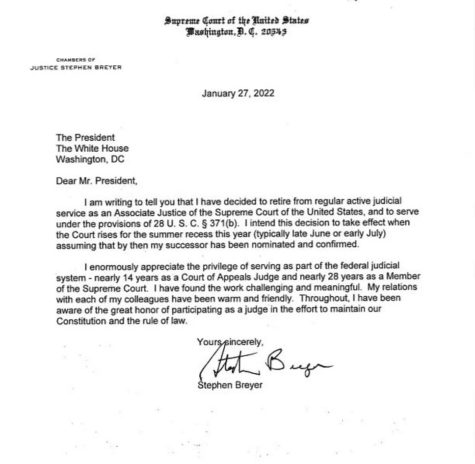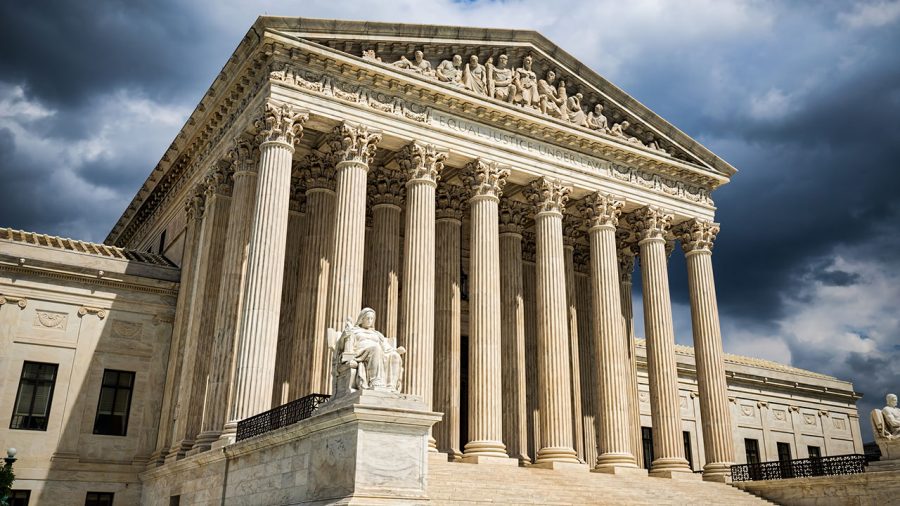Biden continues the 27-year legacy
The U.S. Supreme Court, also the final court of the U.S. judicial system, reviews and overturns the decisions of lower courts. It contains original jurisdiction in certain cases involving public officials, ambassadors, or disputes between states. The Supreme Court housed in Washington D.C. represents the historical “last word” in American decision-making.
February 28, 2022
On January 27, Justice Stephen Breyer announced his retirement from the Supreme Court at age 83 after serving for 27 years. Born in San Francisco, California, the careers of Breyer’s parents exposed him to both the law and political activity at a very young age. His father worked for the San Francisco Board of Education as legal counsel, and his mother’s work focused on public service. Breyer studied law at Harvard University and graduated three years later.
In 1994, President Bill Clinton appointed Breyer to the Supreme Court of the United States. Clinton had considered Breyer for a spot on the Supreme Court the year before as well, but Breyer lost the spot to Justice Ruth Bader Ginsburg. Dedicated in his pursuit to join the highest United States court, Breyer held a meeting with President Clinton. His persistence paid off, and on August 3, 1994, he took his oath to the Supreme Court of the United States.
People know Bryer for his significant history of respecting decisions made by the legislature. However, this does not outweigh Breyer’s desire to consider real-world consequences. Breyer has given favorable rulings when it comes to issues such as the rights of the LBGTQ+ community and reproductive rights.
Although people frequently portray Republican-appointed members of the court as pro-religious liberty (to support the constitutional guarantee of religious freedom) the media, as a democrat Breyer voted in favor of religious liberty during his tenure. In 9 of 13 religious liberty cases since 2006, Breyer joined the majority to rule in favor of religious rights. One study categorized him in the top half of the most pro-religion justices to serve on the court since 1953.
Liberals have urged Breyer to retire so they can choose his successor. During his presidential campaign, Joe Biden promised that his nominee would fulfill the title of the court’s first black woman.

(WSBTV)
“Our process is going to be rigorous. I will select a nominee worthy of Justice Breyer’s legacy of excellence and decency. While I’ve been studying candidates’ backgrounds and writings, I’ve made no decision except one: the person I will nominate will be someone with extraordinary qualifications, character, experience and integrity. And that person will be the first Black woman ever nominated to the United States Supreme Court,” Biden said.
Worried by the ideological split of the court, the Democrats also considered expanding the court’s bench in 2020 to ensure that the court does not remain strongly to the right for the next 30-40 years or so.
“The timing of Justice Breyer’s retirement is not surprising at all and it is not just because he is in his 80s. Since President Biden is a Democrat and the Democrats currently control the Senate by a very thin margin (they are the ones who must confirm a president’s nominee), many in the party believe this is the best chance they have to get a new Justice who reflects their ideology. Their concern is that if the Democrats could lose the majority in the 2022 election and that President Biden would lose the leverage to get the kind of judge he believes should sit on the Court,” AP Government teacher Steven Butler said.
Replacing Breyer will ensure that the Democrats can retain the current 6-3, conservative-liberal split. Biden makes history with this approach and will choose a nominee, hopefully before February ends.







